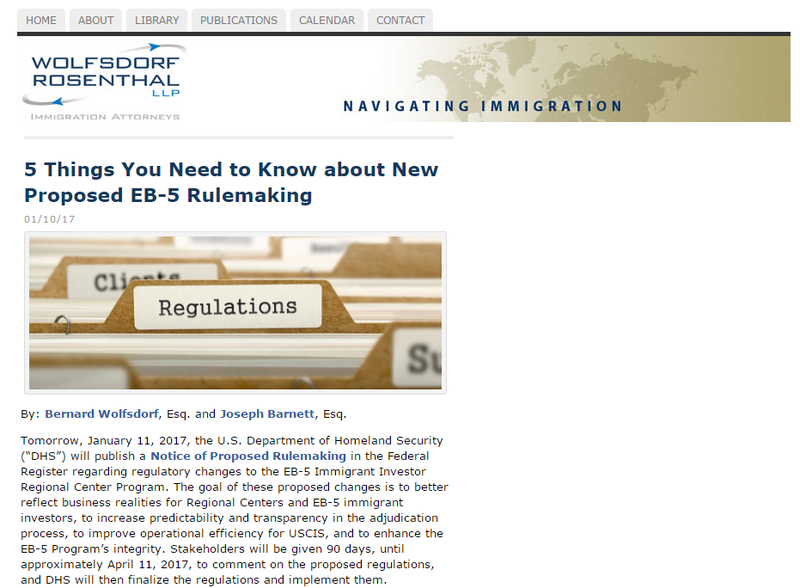5 Things You Need to Know about New Proposed EB-5 Rulemaking
Tomorrow, January 11, 2017, the U.S. Department of Homeland Security (“DHS”) will publish a Notice of Proposed Rulemaking in the Federal Register regarding regulatory changes to the EB-5 Immigrant Investor Regional Center Program. The goal of these proposed changes is to better reflect business realities for Regional Centers and EB-5 immigrant investors, to increase predictability and transparency in the adjudication process, to improve operational efficiency for USCIS, and to enhance the EB-5 Program’s integrity. Stakeholders will be given 90 days, until approximately April 11, 2017, to comment on the proposed regulations, and DHS will then finalize the regulations and implement them.
Here are five things you need to know:
- At this Time, No Changes to Minimum Investment Amount or Definition of “Targeted Employment Area”. The new, proposed regulations do NOT tackle the issues of minimum investment amounts or make changes to the definition of “Targeted Employment Areas”. Instead, by publishing this advanced notice, DHS is providing a formal invitation to participate in shaping the proposed rule, and this publication starts the notice‐and‐comment process in motion. At this time, DHS is merely looking to make “operational and security updates to the Regional Center Program while minimizing the impact of such changes on regional center operations and EB-5 investors.”
- Initial Regional Center Designation and Exemplar Approval Changes. DHS is seeking to split the process between obtaining initial Regional Center designation and obtaining EB-5 project approval via an exemplar. DHS would first require submission of a more general application for initial designation, and then, subsequent to designation, would require submission of a more specific application for approval of an exemplar project.
- Mandatory Exemplar Process. This new exemplar process would be potentially required for both individual EB-5 immigrant petitions and for Regional Center designation. Thereafter, DHS would require the approval of such an exemplar before any investor may submit his or her EB-5 immigrant petition associated with a project covered by such request. In reality, this is already the case for many projects. DHS is also seeking comment on the “appropriate validity period for the approval of an exemplar project,” with a possible 2-3 year validity. DHS is also seeking comment on what would constitute a “material change” of an approved exemplar.
- Safeguards for Monitoring and Oversight. DHS is looking for comments on potential methods for ensuring an appropriate level of monitoring and oversight to ensure that all Regional Center (a) use immigrant investor funds to promote economic growth, and (b) protect against the misuse of such funds. These methods could include Regional Center attestations, the submission of detailed information about the Regional Center’s oversight efforts of its NCEs and JCEs, and other compliance and enforcement mechanisms.
- Continued Participation and Termination of Regional Centers DHS is considering changes to the regulations governing continued Regional Center designation, including changes that would require existing and newly designated regional centers to demonstrate that they continue to meet applicable statutory and regulatory requirements. These include (a) evidence of active participation in the EB-5 Immigrant Investor Regional Center Program, (b) periodic demonstrations that the Regional Center has active monitoring and oversight activities, and (c) prompt notification to DHS of significant changes to a Regional Center.
- Additionally, DHS is considering explicitly listing as activities that would result in termination of the Regional Center. These include (a) failure to meet the continued participation requirements (b) obtaining designation by fraud or misrepresentation; (c) using unlawfully sourced funds to run regional center operations; or (d) misusing investor funds, including, but not limited to, use in any unlawful activity (e.g., Ponzi schemes).
In conclusion, the much anticipated regulations are an important step forward to ensure the integrity of the EB-5 Immigrant Investor Regional Center Program. DHS is to be commended for its open-mindedness in reaching out to stakeholders for input as it develops new policy to improve the EB-5 Immigrant Investor Regional Center Program
This post is designed to provide practical and useful information on the subject matter covered. However, it is provided with the understanding that no legal, tax, accounting, or other professional services are being rendered or provided. If legal advice or other expert assistance is required, the services of a competent professional should be sought.
Wolfsdorf Rosenthal LLP is a full-service immigration law firm with offices in Los Angeles and New York known worldwide for its unmatched excellence in providing top-quality U.S. immigration representation.”
http://connect.wolfsdorf.com/?p=2594
Mentions
- Wolfsdorf Immigration Law Group
- U.S. Citizenship and Immigration Services
- Bernard Wolfsdorf
- Joseph "Joey" Barnett
States
- California
Securities Disclaimer
This website is for informational purposes only and does not constitute an offer or solicitation to sell shares or securities. Any such offer or solicitation will be made only by means of an investment's confidential Offering Memorandum and in accordance with the terms of all applicable securities and other laws. This website does not constitute or form part of, and should not be construed as, any offer for sale or subscription of, or any invitation to offer to buy or subscribe for, any securities, nor should it or any part of it form the basis of, or be relied on in any connection with, any contract or commitment whatsoever. EB5Projects.com LLC and its affiliates expressly disclaim any and all responsibility for any direct or consequential loss or damage of any kind whatsoever arising directly or indirectly from: (i) reliance on any information contained in the website, (ii) any error, omission or inaccuracy in any such information or (iii) any action resulting therefrom.




